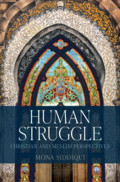Book contents
- Human Struggle
- Human Struggle
- Copyright page
- Dedication
- Contents
- Acknowledgements
- Notes on Text
- Introduction
- 1 Human Struggle: Literary, Theological and Philosophical Reflections
- 2 The Search for Salvation in Rainer Maria Rilke and Abu Hamid al-Ghazali
- 3 Community and Divine Calling in Dietrich Bonhoeffer and Sayyid Qutb
- 4 Contemporary Islam and the Struggle for Beauty
- 5 The Struggle for Hope in an Age of Uncertainty
- Epilogue
- Bibliography
- Index
3 - Community and Divine Calling in Dietrich Bonhoeffer and Sayyid Qutb
Published online by Cambridge University Press: 11 February 2021
- Human Struggle
- Human Struggle
- Copyright page
- Dedication
- Contents
- Acknowledgements
- Notes on Text
- Introduction
- 1 Human Struggle: Literary, Theological and Philosophical Reflections
- 2 The Search for Salvation in Rainer Maria Rilke and Abu Hamid al-Ghazali
- 3 Community and Divine Calling in Dietrich Bonhoeffer and Sayyid Qutb
- 4 Contemporary Islam and the Struggle for Beauty
- 5 The Struggle for Hope in an Age of Uncertainty
- Epilogue
- Bibliography
- Index
Summary
Throughout history, political life has often been marked by the struggle of individuals who wanted to take their societies in a different direction. This chapter looks at two giants of twentieth century theology and political theology, Dietrich Bonhoeffer (1906–45) and Sayyid Qutb (1906–66). Born in the same year, both men were products of their political environment, Qutb in the context of European colonial rule and Bonhoeffer in the context of the rise of Nazism and anti-Semitism in Germany. Their lives bear witness to what they thought their respective Muslim and Christian faith required from them as individuals and for their societies. At a time when the word jihad, is ingrained on our minds and conflates personal, social and militant struggle against the state, in some ways, these two people epitomise the complexities of keeping faith linked to an ethical and political purpose. They wrote about their faith and ethics as citizens and as prisoners and while they have left very different legacies, both men were eventually hanged on charges of conspiring against the state. Sayyid Qutb criticised the Muslim world for lapsing into a state of ignorance and unbelief (jahiliyya) alongside his condemnation of the West and America in particular for its violence, sexual freedoms and materialism. While he regarded Islam as the solution to the world’s injustices, he remains a controversial figure, especially in the West where his writings are frequently associated with inspiring violence, Islamist ideologies and movements. Qutb argued that religion is not a mere theory, but also a programme, a reality and a movement for life. For him, any action that is not inspired by faith and divine law has no value. The struggle to realise divine law was not a temporary phase but rather an eternal state because ‘truth and falsehood cannot co-exist on this Earth’. For Bonhoeffer, the accusation against his fellow Christians was not one of unbelief but still a critique of their less than Christ-like ways of being Christian. The political and theological struggle of the time focused on how Christians were to act responsibly in the Church Struggle created by Hitler and Nazism. Bonhoeffer never ceased to believe in the church despite being disillusioned by its failures. He became a leading figure in the Confessing Church which stood in open conflict with the German Reich Church who supported the Nazi government. His writings focused on a Christ-centred spirituality in that one could not separate Jesus’s commands from secular life; costly grace means obedience to the call of Jesus Christ. Both men went from believing in the state to ultimately seeing it as unjust and transgressing the law. In the end they both died at the hands of the state and their prison writings bear testimony to their character and their personal faith in the face of this complex struggle.
- Type
- Chapter
- Information
- Human StruggleChristian and Muslim Perspectives, pp. 83 - 138Publisher: Cambridge University PressPrint publication year: 2021

